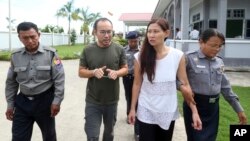Three journalists and their driver could face up to three years in prison for allegedly violating Myanmar's import-export law by bringing a drone into the country as part of a documentary they were doing for Turkish state television TRT.
Mok Choy Lin of Malaysia, Lau Hon Meng from Singapore, local journalist Ko Aung Naing Soe, and driver U Hla Tin were arrested in the capital Naypyidaw on October 26 after interviewing a legislator and then bringing out the drone to get aerial footage of the parliament building.
They already have been sentenced to two months in jail on a summary conviction for breaking the country's 1934 Aircraft Law.
TRT says the journalists obtained all the required permits to do their story, but the arresting officer said they had not declared the drone when they entered the country.
In seeking to have the import charge dropped, their attorneys claim the four are being subjected to double jeopardy since they already had been convicted in the case. The next court date was set for Monday.
Speaking to journalists in the court, Mok Choy Lin said they were still in the dark about the legal process.
"We don't know what's going on. We don't really understand their legal system," she said. "We don't understand their language and nothing is really explained to us. For the first week of remand, we weren't even allowed to meet our family or lawyers."
Reporters Without Borders (RSF) urged officials "to abandon the absurd proceedings."
"The judicial authorities must drop these spurious charges, which are clearly being used to prevent journalists from doing their work," said Daniel Bastard, head of RSF's Asia-Pacific desk. "These two journalists and their co-workers should not have to suffer because of political and diplomatic circumstances."
Myanmar has been criticized for the military's actions in Rakhine state against minority Rohingya Muslims, who have claimed soldiers carried out rape and murder while burning their villages, sparking a mass exodus across the border into Bangladesh.
Turkish President Recep Tayyip Erdogan used the term "genocide" in September, straining ties between the two countries.
Despite emerging from a military dictatorship and making moves toward democracy, the military remains a powerful force in the country. It has denied committing any abuses against the Rohingyas and says troops were responding to deadly attacks attributed to Rohingya extremists on security forces.
VOA Turkish service contributed to this report.





